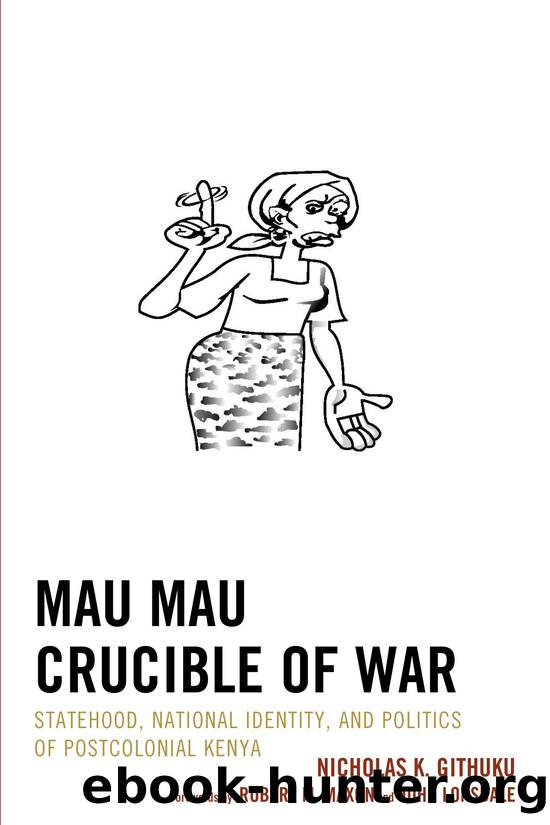Mau Mau Crucible of War by Githuku Nicholas K.;Maxon Robert M.;Lonsdale John;

Author:Githuku, Nicholas K.;Maxon, Robert M.;Lonsdale, John;
Language: eng
Format: epub
Publisher: Lexington Books
Figure 5.1 JM warned that the mess Kenya was in could result in the creation of a small elite island of wealth with the masses on a different island of poverty. This would necessitate the maintenance and entrenchment of political power by the ruling elite through the ruthless means of police and military suppression. Source: âPoverty,â by Gado, 21st September 2005.
JMâs scathing denunciations of high-level corruption struck a chord among people. Barred from speaking at any public meeting since 1970, JM put together thoughts that had been throbbing in his heart, and ideas distilled in his mind, for at least four years, into a seminal printed campaign âspeechâ tract distributed just before the October 1974 elections.186 In this document, JM made the compelling argument that every Kenyan was entitled to a decent and just living which is a birthright; and that s/he was entitled, as far as it was humanly possible, to equal education, job and health opportunities irrespective of parentage, race or creed or area of origin. This, JM added, was the primary task of the government machinery. After all, many Kenyans had fought for independence with sweat, blood and sacrificed their lives. To what end had they suffered, and was such suffering justified, JM posed.187 JM captured and spoke to the very heart of the nation when he added:
All of us big and small alike, some educated, many uneducated, few rich, many poor, few employed and many unemployed, few privileged and vast numbers without privilege joined hands together to expel colonialism because that system was unjust, discriminatory, sectional and to a large measure irrational when it came to considering the interests of the indigenous peoples of this land.
We combined forces for many years to fight colonial and racialistic injustices; Injustice in social, economic and political opportunities. The result of our independence indeed its meaning; is, or ought to be, justice among all our peoples.
But it is no justice if some of our children cannot afford education; live in inhuman conditions, die before getting to health centres and die of hunger or malnutrition. It is no justice to spread education, health, agricultural, business and other opportunities unevenly and without regard to the interests of the nation as a whole concentrating them on [sic] certain areas only.
It is no justice for a few to live in, and own the best houses in the cities and towns while the majority of our hard-toiling men and women live in squalid conditions in cities and towns, not to mention in most of rural Kenya.
It is no justice for a few greedy people with influence and connections to utilize resources of the public, now Government supported or funded institutions to unfairly acquire wealth of all manner of things; houses, the best commercial premises and the best and largest tracts of land.188
In light of such profound truth-telling, its resonance, with the sociopolitical reality, and the ordinary people affected by it, cannot be left to the imagination. The peopleâs voice had spoken and, in so doing, echoed reality.
Download
This site does not store any files on its server. We only index and link to content provided by other sites. Please contact the content providers to delete copyright contents if any and email us, we'll remove relevant links or contents immediately.
The Vikings: Conquering England, France, and Ireland by Wernick Robert(79224)
Ali Pasha, Lion of Ioannina by Eugenia Russell & Eugenia Russell(39942)
The Vikings: Discoverers of a New World by Wernick Robert(36831)
The Conquerors (The Winning of America Series Book 3) by Eckert Allan W(36716)
Cecilia; Or, Memoirs of an Heiress — Volume 1 by Fanny Burney(32094)
Cecilia; Or, Memoirs of an Heiress — Volume 3 by Fanny Burney(31482)
Cecilia; Or, Memoirs of an Heiress — Volume 2 by Fanny Burney(31436)
Empire of the Sikhs by Patwant Singh(22780)
Hans Sturm: A Soldier's Odyssey on the Eastern Front by Gordon Williamson(18341)
The Secret History by Donna Tartt(18269)
Cat's cradle by Kurt Vonnegut(14804)
Sapiens: A Brief History of Humankind by Yuval Noah Harari(14006)
Pimp by Iceberg Slim(13828)
Talking to Strangers by Malcolm Gladwell(12916)
Norse Mythology by Gaiman Neil(12880)
Leonardo da Vinci by Walter Isaacson(12834)
Underground: A Human History of the Worlds Beneath Our Feet by Will Hunt(11857)
4 3 2 1: A Novel by Paul Auster(11843)
The Radium Girls by Kate Moore(11652)
